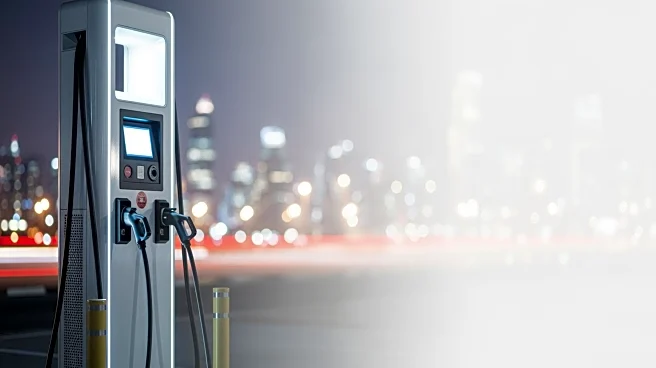What's Happening?
Consumer Reports conducted a survey to assess the reliability of public electric vehicle (EV) charging networks across the United States. The survey included major networks such as Shell Recharge, EVgo,
Blink, Tesla Supercharger, and Rivian Adventure Network. Findings revealed that the Shell Recharge network received the most complaints, while Tesla Supercharger and Rivian Adventure Network were noted for fewer issues. The survey highlighted common problems faced by EV owners at public charging stations, including payment issues, charging power problems, and hardware malfunctions. Notably, DC Fast Chargers were reported to have the highest incidence of issues, with 34% of users experiencing problems, compared to 25% for Level 2 chargers and only 4% for Tesla Superchargers.
Why It's Important?
The reliability of public EV charging networks is crucial for the widespread adoption of electric vehicles. As the U.S. aims to reduce carbon emissions and transition to cleaner energy sources, efficient and dependable charging infrastructure is essential. The survey results indicate that while some networks are performing well, others may deter potential EV buyers due to frequent issues. This could impact the growth of the EV market and hinder environmental goals. Companies operating these networks may need to address these concerns to improve user experience and support the transition to electric mobility.
What's Next?
EV charging network operators may need to invest in infrastructure improvements and customer service enhancements to address the issues identified in the survey. This could involve upgrading hardware, refining payment systems, and increasing the availability of reliable charging stations. As the demand for EVs continues to grow, these networks will play a pivotal role in supporting the transition to electric transportation. Stakeholders, including government agencies and private companies, may collaborate to ensure the development of a robust and reliable charging infrastructure.
Beyond the Headlines
The survey results may prompt discussions on the standardization of charging technology and protocols to ensure compatibility and reliability across different networks. Additionally, there could be increased scrutiny on the environmental impact of charging infrastructure, pushing for sustainable practices in the development and operation of these networks. Long-term, this could lead to innovations in charging technology and a more integrated approach to energy management in the transportation sector.











